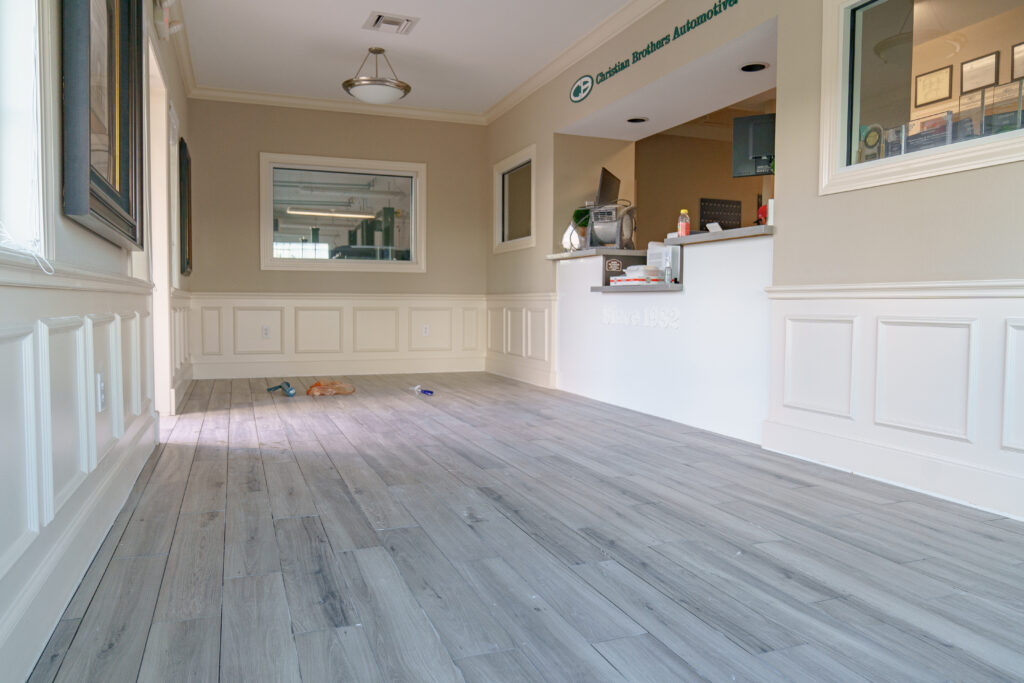Flooring choices only a few decades ago were somewhat limited for homeowners. Carpet and linoleum were still very much in vogue, with tile only beginning to be given serious consideration outside of mud rooms or kitchens. For the somewhat wealthy, solid hardwood was a more expensive option meant to dazzle visitors. But advanced flooring technology such as laminate or waterproof flooring was still years in the future.
One fairly recent advancement in flooring has been engineered hardwood flooring, a type designed to mimic the real article in every way, but at a cheaper cost. What are the advantages and disadvantages of choosing engineered hardwood flooring for your home or business? Our flooring experts break it down.
The Benefits and Drawbacks of ‘Regular’ Hardwood
Hardwood flooring is very much a ‘what you see is what you get’ flooring choice. Flooring must be chosen with traffic and durability in mind, so nearly all hardwood floors are made of the sturdier ‘hard’ woods: typically maple, walnut, cherry or oak. One major advantage that hardwood has that many other flooring options do not is that hardwood can be sanded and refinished multiple times to regain its earlier youthful appearance.
If hardwood floors become scuffed or lightly damaged, it can usually be buffed out multiple times to look good as new. This renewable ability of hardwood flooring means that most hardwood can remain in good condition for decades, even up to a century, before needing to be replaced.
However, it’s not all upside when it comes to hardwood. Pre-finished solid hardwood can run upwards of $30 per square foot, not counting installation and labor costs, making it one of the most expensive flooring options in the industry. As the name suggests, hardwood is also quite hard on the feet and generally has very little springiness when walked upon. Lastly, solid hardwood is not water resistant and can warp or crack if exposed to persistently wet or even humid conditions.
The Pros and Cons of Engineered Hardwood
So how does engineered hardwood flooring stack up when compared to the genuine article? It depends on which flooring attributes you find most important. If you’re a DIYer, you’ll almost certainly find engineered flooring to be easier to install. Solid hardwood involves nailing the wood planks into the subfloor with precision accuracy, a project that does require some carpentry skill. Engineered flooring is typically installed by interlocking or gluing planks and requires less effort or specialized knowledge.
Engineered flooring consists of a plywood core covered by a thin layer of hardwood and a veneer on top. Its materials are less expensive than genuine hardwood and – as installation is a less arduous process – labor costs are cheaper as well. Despite this lower cost, engineered hardwood technology has advanced to the point where differences in appearance between types of hardwood is negligible at best and it is often mistaken for ‘real’ hardwood. Engineered hardwood is also a ‘floating’ floor, which means it is not nailed to the subfloor, but instead is snapped together. This installation type tends to create a springier and more comfortable experience for your feet.
As handsome and reliable as engineered hardwood may be, it does carry some inherent drawbacks. Because it only has a thin layer of hardwood over a plywood core, it cannot be sanded or refurbished like regular hardwood. As such, it has a shorter expected lifespan of roughly 20-30 years. Engineered flooring is also generally prefinished and has fewer color or style options as regular hardwood, which is virtually unlimited due to the many different tree species it is cut from. Finally, while there is no solid evidence to show that engineered flooring detracts from the value of a home, since it is nearly indistinguishable from real hardwood, it does not add to a home’s value like hardwood can.
Is Engineered Hardwood Flooring the Right Fit for You?
There is no ‘perfect’ type of flooring for all rooms, homes, or climates. Indeed, there are many factors to take into account when considering what type of flooring is the best choice and in which rooms it should be installed. While engineered hardwood flooring is not solid hardwood through-and-through, it is all wood, as opposed to composite or laminate flooring. It is not quite as durable and doesn’t have as long a lifespan, but it’s a cheaper option that looks like the real thing and is easy to replace when it’s finally seen all the traffic it can handle.
At Texas Pride Custom Floors, our team of flooring experts are eager to greet you with a smile, a handshake, and a promise to thoroughly and carefully evaluate your flooring needs and help you solve them as if your home was their own. Contact us today to discuss how we can make your flooring dreams a reality!
